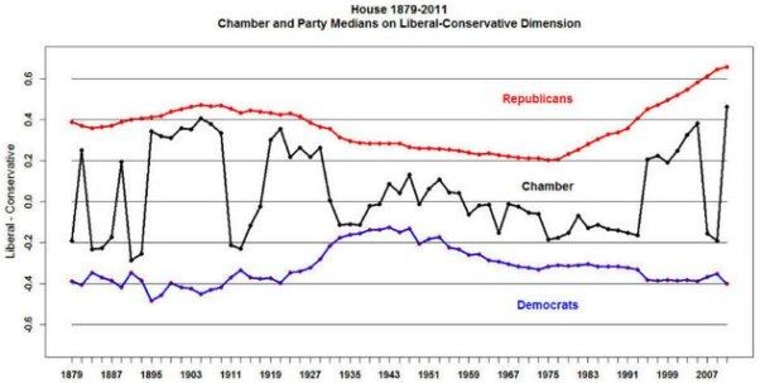A couple of weeks after the 2008 election, the Weekly Standard ran an interesting piece, listing ideas then-President Elect Obama could pursue if he were serious about governing in a unifying, post-partisan way. The writer, Peter Berkowitz, was skeptical, but if Obama were sincere about leading in an even handed way, here were seven steps he could take.
Three and a half years later, Obama embraced nearly all of the Weekly Standard's recommendations. Indeed, the Democratic president went even further, putting Republicans in high-ranking administration positions; expressing a willingness to compromise; and pursuing an agenda that was moderate and mainstream, embracing ideas that enjoyed bipartisan backing.
I thought of this reading Charles Krauthammer's new column, complaining about how "divisive" Obama is. "The entire Obama campaign," the columnist argues, "is a slice-and-dice operation."
It makes a mockery of Obama's pose as the great transcender, uniter, healer of divisions. This is the man who sprang from nowhere with that thrilling 2004 convention speech declaring that there is "not a black America and white America and Latino America and Asian America; there's the United States of America."That was then. Today, we are just sects with quarrels -- to be exploited for political advantage.
Yes, that rascally Obama said he would reach across the aisle, work in good faith, and bring people with different ideologies together in a spirit of shared values and common purpose, but now he's, as Krauthammer's column put it, the "Divider in chief."
I wonder if Krauthammer has considered what it's like to try to be a unifying force during a time of multiple crises when the opposition party's only goal is to obstruct and destroy.
Why did Obama's efforts to bring people together fall short? Let me give you a hint in the form of a chart:
Today's Republican Party is the most conservative it's been in a century. Making matters considerably worse, GOP lawmakers decided on Jan. 20, 2009, that they would not work with this president.
Robert Draper has a new book coming out, which shines a light on a private meeting "top Republican lawmakers and strategists" held, literally the same day as Obama's inauguration.
According to Draper, the guest list that night (which was just over 15 people in total) included Republican Reps. Eric Cantor (Va.), Kevin McCarthy (Calif.), Paul Ryan (Wis.), Pete Sessions (Texas), Jeb Hensarling (Texas), Pete Hoekstra (Mich.) and Dan Lungren (Calif.), along with Republican Sens. Jim DeMint (S.C.), Jon Kyl (Ariz.), Tom Coburn (Okla.), John Ensign (Nev.) and Bob Corker (Tenn.). [...][T]he book says they plotted out ways to not just win back political power, but to also put the brakes on Obama's legislative platform. "If you act like you're the minority, you're going to stay in the minority," Draper quotes McCarthy as saying. "We've gotta challenge them on every single bill and challenge them on every single campaign."
Together, they sketched out a plan over the course of four hours: attack Tim Geithner, show "unyielding opposition" to every economic proposal, launch early attack ads targeting vulnerable Democrats. The GOP leaders left their meeting "almost giddily."
As Jamelle Bouie explained, "In other words, there was nothing President Obama could have done to build common ground with Republicans. From the beginning, the plan was to relentlessly obstruct Obama, regardless of whether that was good for the country The GOP's high-minded rhetoric of compromise and bipartisanship was bunk."
In Krauthammer's mind, Obama's a "divider." But for anyone inclined to be fair and intellectually honest, who's driving the divisions?
Tom Mann and Norm Ornstein have a perspective Krauthammer may want to consider: "The GOP has become an insurgent outlier in American politics. It is ideologically extreme; scornful of compromise; unmoved by conventional understanding of facts, evidence and science; and dismissive of the legitimacy of its political opposition. When one party moves this far from the mainstream, it makes it nearly impossible for the political system to deal constructively with the country's challenges."
